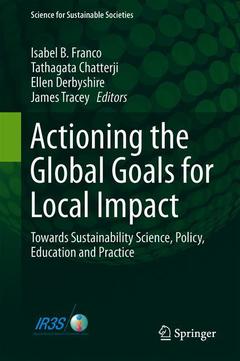Actioning the Global Goals for Local Impact, 1st ed. 2020 Towards Sustainability Science, Policy, Education and Practice Science for Sustainable Societies Series

This book highlights the value of sustainability science in newly emerging and innovative approaches to research, education, capacity building and practice in order to transform rhetoric into impact sustainability. Presenting case studies from various industries, sectors and geographical contexts targeting the seventeen (Sustainable development Goals (SDGs) outlined in the 2030 Agenda, it provides insightful recommendations to create sustainable impact while at the same time achieving the global goals.
The book addresses the fundamental question of how sustainability rehtoric can be transformed into impact sustainability research, education and capacity building and as a result, how existing approaches in science, curricula and practice are mitigating the demands emerging from addressing global sustainable development in an impactful and innovative manner. Providing recommendations for impact sustainability in science, curriculum on how to address pressing sustainability issues and contribute toward achieving the SDGs, this book is an essential reference for both academics and professionals.
Isabel B. Franco, PhD, is an international leader in sustainability science, policy and practice interested in exploring the role of industry in fostering sustainable, inclusive development. She does this through the development, refinement and application of sustainability assessment, methods and techniques. She has applied those tools to various industries such as extractives (mining, oil and gas), higher education, finance and banking, public sector and international development in Australia, Japan, Thailand, Colombia, Chile, Bolivia, Angola and Zambia. She has been an international advisor for various international organisations, namely, UNDP, UNESCAP, UNU and British Council. She has authored various peerreviewed publications and has co-authored UN Books Socially Responsible Business: A Model for a Sustainable Future and The Corporate Agenda of Sustainable Development. With a PhD in Governance and Sustainability from the University of Queensland, Australia, she has managed large multilingual research and consulting projects globally. She has also held academic appointments at the United Nations University – Institute for the Advanced Study of Sustainability (Japan), Keio University (Japan), The University of Queensland (Australia), University of Zambia (Zambia) and Universidad Nacional de Colombia (Colombia). She is the Founder of eWisely (Exceptional Women in Sustainability), the fastestgrowing connector of women in sustainability, globally. Her work can be consulted on her Lab DrIsabelFranco.com.
Tathagata Chatterji is a Professor of Urban Management and Governance at Xavier University, Bhubaneswar. His research interests are: urban sustainability and the political economy of urbanization in developing countries. He had authored two books – Local Mediation of Global Forces in Transformation of the Urban Fringe and Citadels of Glass – India’s New Suburban Landscape. He received the Gerd Al
Introduces case studies from diverse geographical contexts and industries, providing practical recommendations for impact sustainability
Provides insights into themes that cut across sustainability science and that aid the fulfilment of the SDGs, building more resilient, sustainable, equal and inclusive societies and environments
Defines the existing sustainability gaps in the selected cases (country/sector/region)
Date de parution : 11-2019
Ouvrage de 298 p.
15.5x23.5 cm
Disponible chez l'éditeur (délai d'approvisionnement : 15 jours).
Prix indicatif 105,49 €
Ajouter au panier


